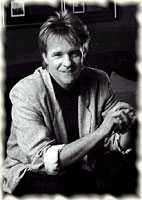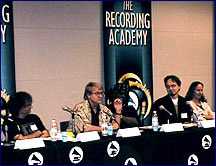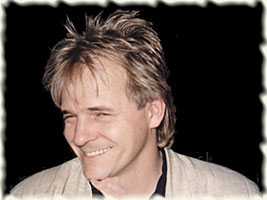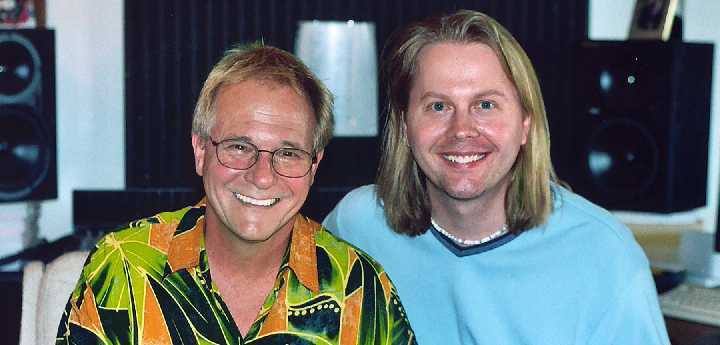 KEITH OLSEN
KEITH OLSEN KEITH OLSEN
KEITH OLSEN
The big 80s stood for
massive AOR productions, with the aim to score the best selling
record. In that period a lot of producers me household words,
such as RON NEVISON, MAX NORMAN, BEAU HILL, KEVIN ELSON, TOM
ALLOM, DESMOND CHILD, DIETER DIERKS, MICHAEL WAGENER, BRUCE
FAIRBAIRN, SPENCER PROFFER, and one of the biggest of them all:
KEITH OLSEN. They all had their own kind of sound, and best known
is that 80s AOR-rock sound of Mr. Keith Olsen. He produced
legendary records by PAT BENATAR, RICK SPRINGFIELD, SCORPIONS,
WHITESNAKE, HEART, KINGDOM COME, FOREIGNER, OZZY , FLEETWOOD MAC,
EDDIE MONEY, SAMMY HAGAR, and also a bunch of lesser-known
forgotten AOR jewels like 707, PREVIEW, TANE CAIN, DARE, MAGNUM,
SHADOW KING, FIONA and many more. From the late 70s until the mid
90s Keith was always producing records, and a lot of them went
straight into the US charts, so Keith is a legend. The best thing
is that he mainly produced AOR/Melodic/Hard rock albums, and this
probably made him the perfect AOR producer in the 80s. 15 years
after all the big successes Keith is settled in Hawaii, from
where he called me to talk about his past and present, and also a
bit about one of the first albums he has produced in 5 years, the
fantastic AOR debut of the American band BONRUD (out on Frontiers
Records soon)...
So where do we start here, Keith, where are you exactly located
right now...
I’m living on the North side of Hawaii, at a small Island
called Kauai. I moved here about a year ago, mainly because I was
fed up with the busy LA area. I wanted to calm down, and live a
normal life instead of the hectic life I had in California. I
have had a very busy life over there for almost 30 years and it
was actually time to find a bit of quality of life, and
that’s why I moved to Hawaii.
 You can easily say that you have done a lot in
your life as a producer, tell me about those busy days in the
1980s...
You can easily say that you have done a lot in
your life as a producer, tell me about those busy days in the
1980s...
I can tell
you that it was such a non-stop rollercoaster ride, a very hectic
place to be, but it was fun. I worked with some of the best
musicians ever, and I have always enjoyed producing, but it was
just such a tight schedule. For 25 years, I never left the
studio. It was non-stop producing records, and I can tell you
that in this period I maybe have had 10 holidays or so, and those
were not really holidays, but just me sitting at a beach
somewhere listening to a walkman writing out charts for my next
act. I just never saw the light of day and was constantly working
with (I need to say this) fantastic musicians, so it was a great
time, a lot of fun, but after some 25 years it got so much
control over my life I just had to stop. I cut over 130 albums,
by 45 different artists, each album I went through 25 or more
songs, picked 10-15, learned them, cut them, put them out... then
went on to the next album.... It's pretty hard to remember all
the little details, but it took so much of my time. So I quit and
calmed down for a bit, although in the late 90s I started working
again, this time as a Director Global Recording Product
Development for Mackie Designs, yes head first into a corporate
company. I was responsible for spearheading the direction and
development of products that target the Recording market, one of
Mackie's main markets. Recently I packed my bags and moved to
Hawaii where I joined some friends of mine (such as
mixer/engineer DAVID TICKLE) who owns a production studio here in
Hawaii, and now I work here behind my desk, making phone calls,
going through e-mails, contacting people and working as a general
partner for STUDIO PANEL (www.studio-panel.com). Also now I am
able to pick things I really like to do, such as the BONRUD CD.
Yes,
please tell me how you got to produce this BONRUD album...
Well, in
my time as director at Mackie I was frequently in touch with
Microsoft, and that’s where I met Paul Bonrud, who is an
engineer for Microsoft. And oneday he gave me a tape and asked me
to give it a listen, so I did just that and heard some cool stuff
on it, and that’s when I decided to give him advice on
future recordings, how to record it, etc. In the beginning I was
just a “mentor” giving Paul advice every week, but
eventually it turned out to be a closer working together in the
following months, which led to the production of their first
full-length CD, which has now been released on FRONTIERS RECORDS.
The album
has that typical early 80s AOR sound you stood for back then...
That’s
right, Paul wanted to keep it as close to that classic rocksound
as possible. I can easily round up the best guitar players to
play the guitar parts, the best drummers, etc. and can easily
make a record sound perfect, but a lot of the new bands just
aren’t good enough. Back in the 80s I knew exactly how to
make a good record sound as good as possible and then it was up
to the labels to promote it properly.
 I would like to ask you to give some comments to
some of the bands you produced, starting with RICK SPRINGFIELD...
I would like to ask you to give some comments to
some of the bands you produced, starting with RICK SPRINGFIELD...
Wow, this goes back a long time ago, because I actually met Rick
back in the very early 70s. He lived in Australia, and was about
to record his first solo-LP ‘Speak to the sky’, which
was released in 1972. I worked with Rick on this album, then just
as it was released the Label got caught with a band called GRAND
FUNK RAILROAD, buying up thousands of copies and stored them in a
warehouse somewhere, so the album would go to number 1, but the
way it was done was very illegal. The label just bought their own
albums, so it would hit big time, and people would eventually
started buying the record. These are tricks labels sometimes do,
which nowadays happens a lot (especially in Holland!), and this
is something that basically killed Rick’s career in the
early 70s. He didn’t make any money on this and around 1973
he was basically broke, had nowhere else to go, and so a friend
of mine rented an apartment for him and paid him subsistence
until he got a job as actor, and from then on it went fast and
Rick became a soap star, although he definitely wanted to make
music. Anyway, time went by and then at the end of the 1970s Rick
wanted to make a new record once again (RCA records) and then
they asked me to help out a bit, so I produced two songs, found
the perfect musicians to play on it, had Rick record a SAMMY
HAGAR tune, and it seems Rick had been given a second chance,
because “Jessie’s girl” became one of the top
songs in 1980 here in the USA. Suddenly Rick was a teen star,
although he had passed his 30s already, but Rick was back on
track, and I was in the middle of all the success.
Tell me
about FOREIGNER...
That was
funny, because I had known LOU GRAMM for a while, and back in the
1970s he was singing in this band called BLACK SHEEP. Their label
just signed this band, because Lou had this amazing voice, but
the band wasn’t great. It was tough to listen to the band
although Lou was just such an amazing singer. Lou eventually
found fame and fortune with a very good band (FOREIGNER). BLACK
SHEEP was only signed for 2 albums by a label because of
Lou’s voice. And this is something that happened a lot,
because the labels would only look for the perfect front man, and
not the band behind the singer. Another example is PREVIEW!
Man,
PREVIEW is one of my all-time favourite AOR records...
Funny you
say that, because this band was the ultimate example of a very
bad signing by a label, just because of the amazing front man.
Man, the lead singer for this band (JON FIORE) was so amazing. He
stepped up to the mic and sang, and basically everyone was blown
away, also John Kolodner from the band’s label Geffen
Records. He was fooled, because the band backing Fiore was simply
not good. The secret behind the recording is that I brought in
some very well-known players from some very well-known bands (no
names, it remains a secret!) and they played most of the parts on
the album! These people are not mentioned, but just played the
songs, because the band members couldn’t play well enough!
They had an amazing lead singer, and their songs were extremely
catchy, but there actually wasn’t a real band playing the
songs on the album. Eventually there was no promotion and so the
album never made it big time, although it was an excellent album,
but this was not because of the band, but due to the performance
and talent of Jon Fiore. He eventually became quite successful in
his own right, went
on becoming one of the most wanted commercials singers in the
USA. In the 1980s he sang so many commercials you heard on the
radio, such as beer commercials, shampoo commercials, etc. etc.
but PREVIEW was a band without any professionalism and Jon
basically was the only one who went on do something in the music
business
Never knew
this, but PREVIEW is still one of my fave AOR records, but
let’s move on to TANE CAIN, another record you produced in
the early 80s which never got that big...
The story on Tane, who is actually pronounced “Tawney”
, is interesting. She was the daughter of a famous actor here in
the USA called Doug McClure, and was born and raised in
California. Anyway, it was around 1982 and JOURNEY just had hit
big again in the USA, releasing their popular ‘Escape’
record, which was one of the biggest selling albums back then.
This eventually made the US labels looking for JOURNEY wannabies,
and anything related to JOURNEY or it’s members was
interesting for the labels to sign. Tane was the wife of JONATHAN
CAIN for some time, who had previously joined JOURNEY, after
meeting Tane while playing in THE BABYS back in the 1970s.
Anyway, Tane and Jonathan, Journey’s keyboard player, got an
album deal with RCA RECORDS. It all turned out well, because the
album featured some amazing songs and I brought in some excellent
musicians. The TANE CAIN album was released with some moderate
success, but not as big as the label wanted it to be, so
eventually only 1 TANE CAIN album was recorded. After the record
she focused her career in the movie industry, with some decent
appearances.
Next band
I would like to ask is one of your biggest successes, the 1989
SCORPIONS classic ‘Crazy world’...
OK, this
was probably one of the more successful Scorpion albums, because
the single “Winds of change” from the ‘Crazy
world’ album went on becoming the largest seller ever in the
world for them. The song went to number 1 in 18 countries and in
40 countries it was a top 5 hit. That single alone sold millions
of records, and of course so did their ‘Crazy world’
record. Working with them was sometimes hard, but it seems like I
work with many German bands and working with them always seems
hard, but still it was a great job. I spent a few months in
Hilversum (Wisseloord Studios) where I got to work with Erwin
Musper and Attie Bauw.… I would rather talk about my working
with Attie Bauw, one of the nicest men I ever met and he is also
a fantastic mixer, he does amazing industrial mixes. Attie is a
great guy, and I had a great time with him in Holland doing the
‘Crazy world’ record.
And how
about the 1987 WHITESNAKE record...
Working
with DAVID COVERDALE was just fabulous. He knows exactly what he
wants, and that’s nothing but the best. He works with the
best musicians, treats them very well and he is the kind of guy
you always want to work with when you’re producing a record.
The 1989 record ‘Slip of the tongue’, which was the
follow-up to the multi-million seller ‘1987’ was
extremely hard to do, because after such a giant hit producing
the next record is basically always a hard thing to do, and with
WHITESNAKE there was even more pressure, because David wanted it
to be perfect, and we didn’t want to do 1987 part 2, but to
release a great follow-up. However, I must say that it is always
very hard producing a follow-up to a record that has turned
platinum.
 Speaking of Gold records, how
many did you produce?
Speaking of Gold records, how
many did you produce?
I produced
220 albums, of which more than 45 turned Gold, so that’s 1
in 5 albums I produced went Gold or better. That also means I
also produced a many that didn’t become a a commercial
success, such as PREVIEW or TANE CAIN. This is due to the fact
that only priority releases of the major labels get promoted
heavily, and each month a label has 5 priority releases, so the
rest have to sell on their own. And if you then count the number
of record labels in the USA (<88), you will agree with me that
there is a lot of competition, which makes it impossible to make
each record a gold record.
I always
wondered where and when you started your career, please tell
us...
I started
in the 1960s playing bass in a band called MUSIC MACHINE. We had
a major hit single with the song “Talk Talk”, toured
for 18 months and released 2 records. I am classically trained,
do play bass quite well, some guitar and arranger keyboard. I say
I play guitar OK, but when I produce a record I always can pick
the right guitar player to play a part exactly the way it should
sound. I always say “the best guitar parts are in the phone
book”, that means it’s who you call…. you know who
you bring in to play the parts. Look at today’s records,
some of the new bands feature guitarists who can’t play the
parts on their album, and if they have to play their songs live,
they have a problem. When you’re in the studio, you can
always find the best guitar player or drummer to play on a
record, because “the best guitar parts are in the phone
book”.
What was
the best produced record you did in your life?
Well you
know, it’s hard to pick a favourite or say which one is the
best, because basically all the 220+ records I produced are my
children and you just can’t pick a favourite child of your
own can you?.
Which band
you never produced before would you like to produce?
There are
some bands I would like to produce, but I’ll wait till
something comes to me, it’s not like in the 1980s anymore
when I produced non-stop. I know only want to pick stuff I really
like to do. Some of the music now days is incredible, but
there’s also a lot of crap. Also the way they produce today
is not what I would want ot do. Back in the 1980s when I started
producing a record, I received a tape with 20-30 songs from the
band and they let me pick the best songs, and I would make notes
on how to get the most out of these 10 to 15 selected songs. The
bands would listen to my comments and then we would go into the
studio and record those songs. Now days everything is so
processed, with computers doing the pitch
correcting…yuck…. I would want to go back to capturing
a performance not creating it on a computer… how fake can
you get?. However, I am glad I am now living in Hawaii, enjoying
life and work under relaxing conditions, and basically doing the
things I love doing..
That’s
a good thing to hear, well, it was nice talking with you, I wish
you success with your new company...
Thanks,
yes, for anyone who wants to check out our studio treatment kits,
please go to: http://www.studio-panel.com
Short bio
of Keith Olsen:
Keith Olsen is an industry celebrated
producer of such notable artists as: Fleetwood Mac, Foreigner,
Pat Benatar, Rick Springfield, Santana, The Babys, Sammy Hagar,
Whitesnake, Ozzy Osborne, The Scorpions, Heart, just to mention a
few. His many soundtrack albums include: Footloose, Flashdance,
Tron, Vision Quest, Top Gun, That Was Then-This Is Now and many
more. See:
http://www.allmusic.com/cg/amg.dll?p=amg&uid=SEARCH&sql=R111219#APPEAR
He produced and engineered more than 200 full albums garnering a
1 in 5 gold album ratio and was awarded 6 Grammy’s. He has
sold over 110 million units at retail and his work appears on
more than 250 albums.
During the late 90’s he was headhunted by Mackie Designs, a
pro audio equipment manufacturer, to design, develop, and define
higher end very professional products for their newly started
Mackie Broadcast Professional Division. Being an advocate on
issues concerning the music industry, its problems and
challenges, he ran for the Board of Governors for the Pacific
Northwest Branch of the National Academy of Recording Arts and
Sciences. He was elected to the post of National Trustee of NARAS
in 2001. From this position he has had ever increasing visibility
is areas of Intellectual Property Rights, Illegal Copyright
Theft, and archival of past works. Being in close communication
with noted alliances for the structuring and preservation of
these rights, Olsen has worked tirelessly toward solutions to
benefit all copyright owners. The purpose of archival so as to
not lose the early works not just of old magnetic tape but also
of the current generation of artists is currently the focus of
Mr. Olsen’s work.